Access to expert-recommended resources mental health is more vital than ever as we enter 2025. With mental health challenges rising worldwide, more people are seeking reliable support and guidance to navigate anxiety, depression, and crisis situations.
Trusted resources can make a significant difference by improving wellbeing, preventing crises, and building a sense of community. This article reveals the top 8 resources mental health professionals recommend for 2025, including crisis helplines, online support networks, and specialized digital tools. Explore how these solutions offer immediate help, ongoing support, and tailored care for diverse needs.
Why Expert-Recommended Resources Matter in 2025
The importance of expert-recommended resources mental health professionals endorse has never been more evident. As we enter 2025, individuals, families, and communities increasingly rely on trusted sources to support their wellbeing. Understanding why these resources matter empowers people to access timely, effective help.
The Evolving Mental Health Landscape
Post-pandemic, the demand for resources mental health experts trust has surged. Anxiety, depression, and trauma affect more people than ever, with 1 in 5 adults experiencing mental illness each year (NAMI, 2025). Digital access and telehealth services have expanded rapidly, breaking traditional barriers.
Needs are more diverse now, spanning youth, older adults, BIPOC, LGBTQ+, and veterans. Online peer support groups have seen remarkable growth, offering connection and empathy across demographics. As the landscape evolves, expert guidance is crucial to navigate quality options.
What Makes a Resource “Expert-Recommended”
Not all resources mental health seekers find are created equal. Expert-recommended options are evidence-based, peer-reviewed, and often endorsed by leading organizations such as NIMH, SAMHSA, and NAMI. These resources prioritize accessibility, confidentiality, and inclusivity.
Integration with professional care pathways ensures users receive comprehensive support. For instance, the 988 Lifeline’s national rollout features rigorously trained counselors and robust referral systems. When selecting resources, mental health professionals look for these hallmarks of quality and safety.
How These Resources Support Different Audiences
Expert-recommended resources mental health advocates highlight are tailored for a wide range of needs. Crisis intervention, ongoing support, and specialized services are available for distinct communities. Many offer bilingual assistance and culturally competent care.
There are dedicated hotlines for LGBTQ+ and BIPOC individuals, ensuring sensitive, relevant support. Social support networks, as highlighted in Social support for mental health, provide community-driven help that complements professional care. This personalized approach bridges gaps for veterans, youth, and marginalized groups.
Trends Shaping Resource Recommendations in 2025
In 2025, resources mental health experts recommend are shaped by innovation and inclusivity. AI-driven mental health apps and tools are on the rise, providing accessible self-help and screening. Hybrid models blend digital and in-person support, meeting users where they are.
Peer-led initiatives and community-based programs have gained traction, emphasizing prevention and resilience. Digital therapy platforms continue to grow alongside traditional helplines, offering flexibility and convenience. Staying informed about these trends helps individuals make empowered choices for their mental wellbeing.
Top 8 Resources Mental Health Experts Recommend in 2025
Accessing the right resources mental health experts trust is more important than ever in 2025. With a diverse range of crisis lines, peer support groups, and digital tools, people can find the support they need, when they need it most. Here are the top 8 resources mental health professionals recommend for a healthier, more resilient tomorrow.
1. 988 Suicide & Crisis Lifeline
The 988 Suicide & Crisis Lifeline is a cornerstone among resources mental health experts highlight for immediate crisis support. This free, confidential service operates 24/7, providing help to anyone experiencing emotional distress or thoughts of suicide.
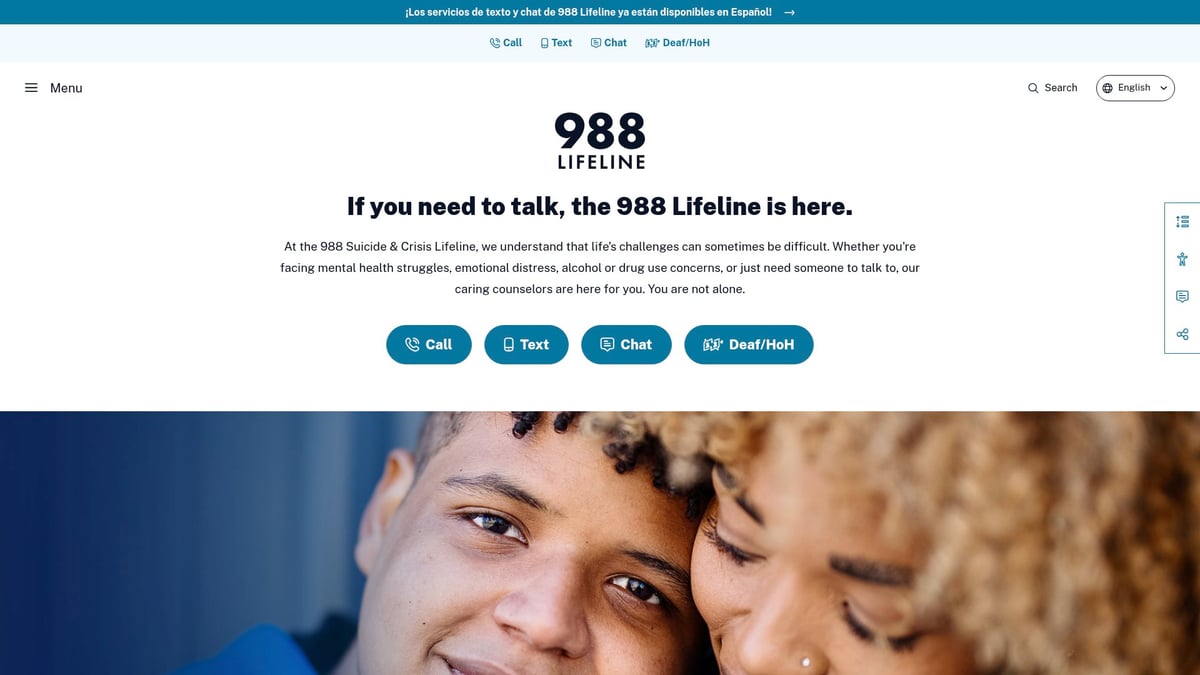
Individuals can reach the lifeline by phone, text, or online chat. Services are available in both English and Spanish, ensuring accessibility for a wide audience. Trained counselors are equipped to de-escalate crises and connect callers to local resources mental health professionals endorse.
Key features:
- National coverage with local connections for ongoing support
- Immediate intervention and suicide prevention strategies
- Multilingual access for inclusivity
Pros:
- Simple access via multiple channels
- Expert staff trained in crisis response
- Available to all ages and backgrounds
Cons:
- Possible wait times during peak periods
Impact: In 2024, the 988 Lifeline handled over 5 million contacts, with a 98% user satisfaction rate. It remains one of the most trusted resources mental health experts recommend for urgent situations.
2. National Alliance on Mental Illness (NAMI) Support Groups
NAMI support groups are a vital part of the resources mental health community members rely on for ongoing support. These peer-led groups are accessible both in-person and online, making it easier for individuals and families to participate regardless of location.
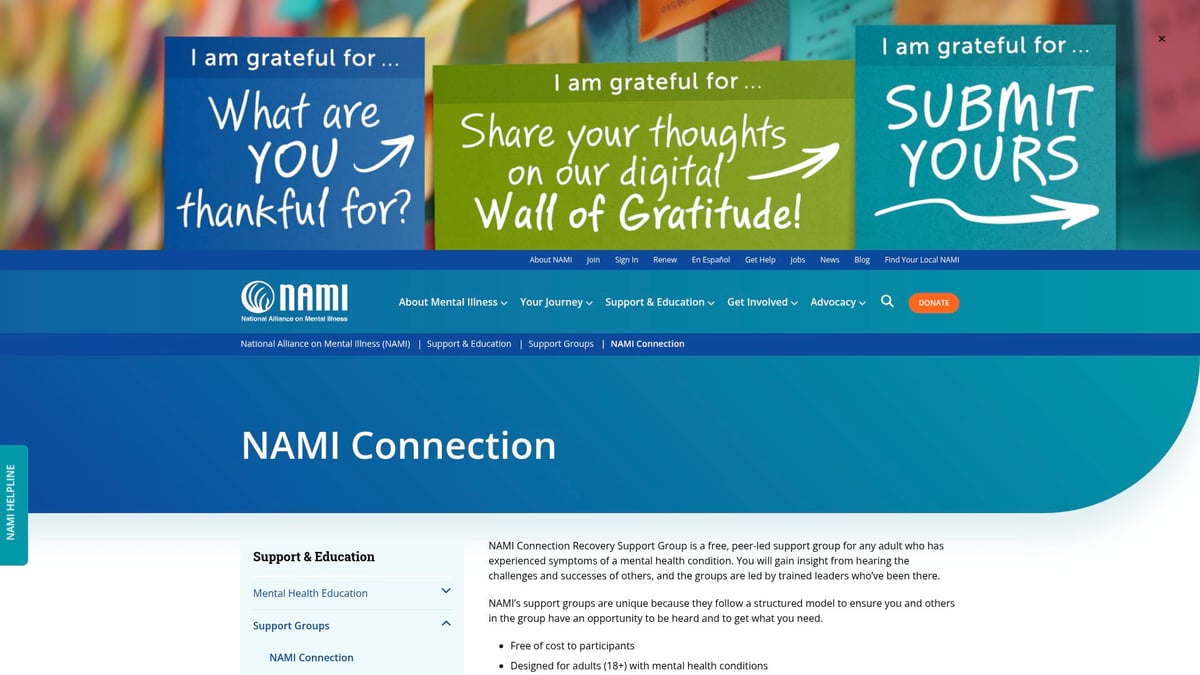
Groups like NAMI Connection Recovery Support Group and NAMI Family Support Group provide a safe, judgment-free environment. Participants share experiences, gain coping strategies, and develop a sense of belonging that can be crucial for recovery.
Key features:
- No cost to join, open to all affected by mental illness
- Flexible formats to fit diverse schedules and needs
- Emphasis on empathy and practical support
Pros:
- Inclusive and non-judgmental atmosphere
- Nationwide network of support
Cons:
- Not designed for acute crisis situations
NAMI support groups empower people to connect with others, reduce isolation, and strengthen their personal toolkit for managing mental health.
3. Substance Abuse and Mental Health Services Administration (SAMHSA) – Find Support
SAMHSA’s Find Support platform stands out among resources mental health professionals often recommend for locating care. This comprehensive database helps users find treatment centers, support groups, and crisis services tailored to their needs.
The platform addresses a wide range of mental health and substance use concerns. It includes resources mental health experts trust for veterans, older adults, and tribal communities. Multilingual support and culturally sensitive materials make it accessible to a broad population.
Key features:
- Up-to-date treatment locator and service directories
- Specialized support for high-need groups
- Streamlined navigation to connect users with the right care
Pros:
- Trusted, government-backed resource
- Comprehensive and current information
Cons:
- Some users may need help navigating the site
In 2024, over 1 million people accessed Find Support, making it a go-to source for discovering resources mental health experts validate.
4. Workplace Mental Health Institute
The Workplace Mental Health Institute (WMHI) is a global leader in providing resources mental health advocates recommend for organizational wellbeing. WMHI offers evidence-based training, trauma-informed care programs, and workplace wellbeing strategy consulting to foster healthier, more resilient teams.
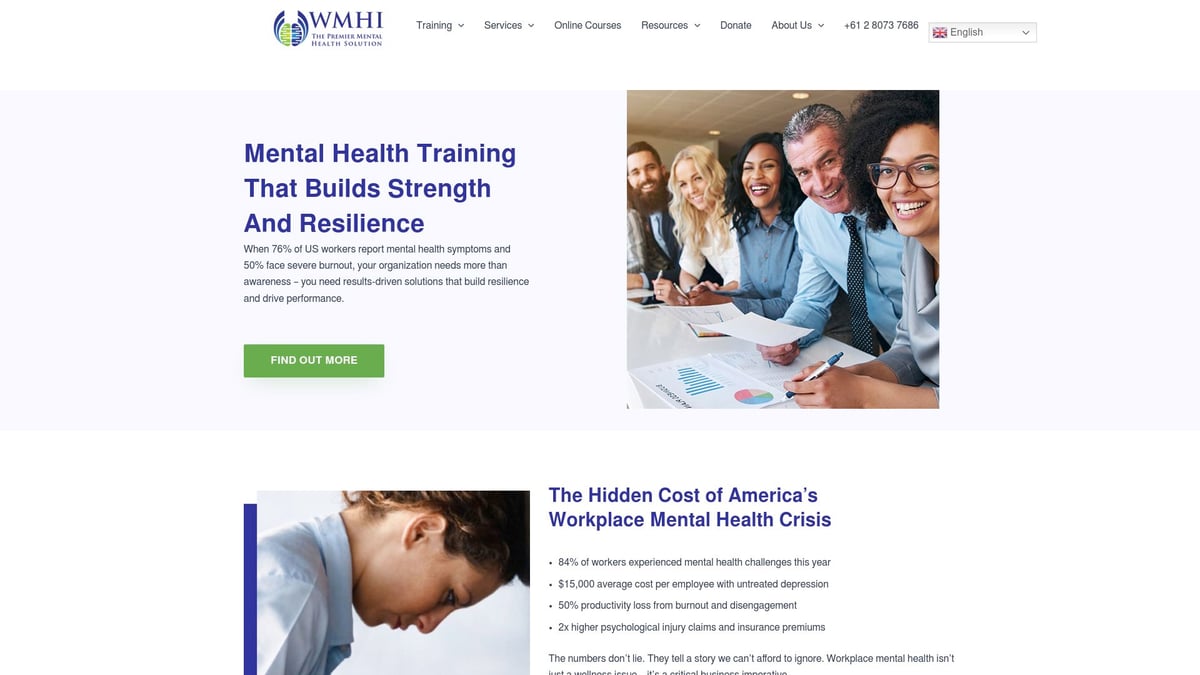
Their approach is strengths-focused, delivering measurable ROI for organizations—up to $110,000 for every $10,000 invested. WMHI’s services help reduce absenteeism, boost performance, and build psychological safety. For strategies on fostering safe environments, see Building psychological safety at work.
Key features:
- Mental health essentials and trauma-informed care training
- Programs for managers, HR leaders, and employees
- Proven outcomes: 33% reduction in absenteeism, 57% improvement in employee wellbeing
Pros:
- Fully qualified trainers and engaging learning experiences
- Global reach and customizable offerings
Cons:
- Pricing available on request
Organizations seeking resources mental health specialists trust for workplace support consistently turn to WMHI for expert guidance and results.
5. The Trevor Project
Among resources mental health professionals recommend for LGBTQ+ youth, The Trevor Project is a standout. This 24/7 crisis intervention and suicide prevention service offers free, confidential support via phone, text, and chat.
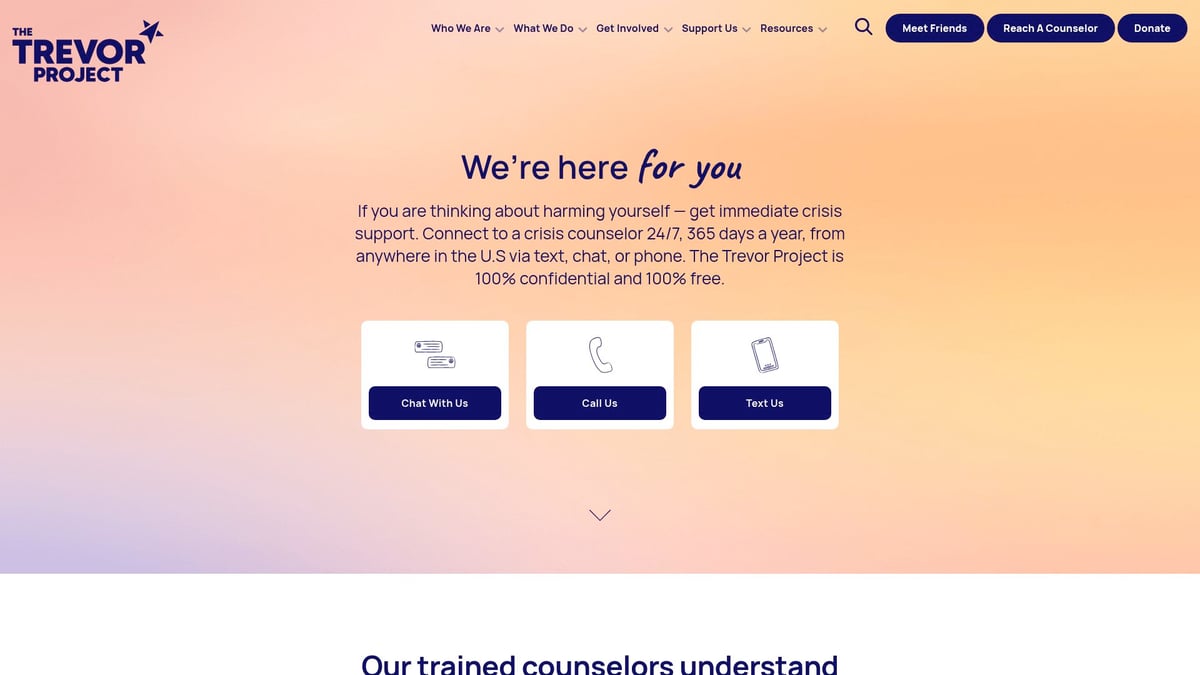
Specialized counselors are trained in LGBTQ+ issues and cultural competency, ensuring an affirming and safe environment. In addition to crisis support, The Trevor Project provides educational materials and a peer support community for ongoing connection.
Key features:
- Immediate support for LGBTQ+ youth in crisis
- Accessible digital platforms for privacy and convenience
- Resources mental health advocates recognize for inclusivity
Pros:
- Inclusive, tailored, and confidential support
- Highly accessible for young people
Cons:
- Primarily focused on youth demographic
With over 500,000 annual contacts, The Trevor Project remains a trusted resource for young people navigating mental health challenges.
6. Veterans Crisis Line
The Veterans Crisis Line is one of the most specialized resources mental health experts recommend for military communities. This 24/7 confidential service connects veterans, service members, and their families with trained responders who understand military culture and unique stressors.
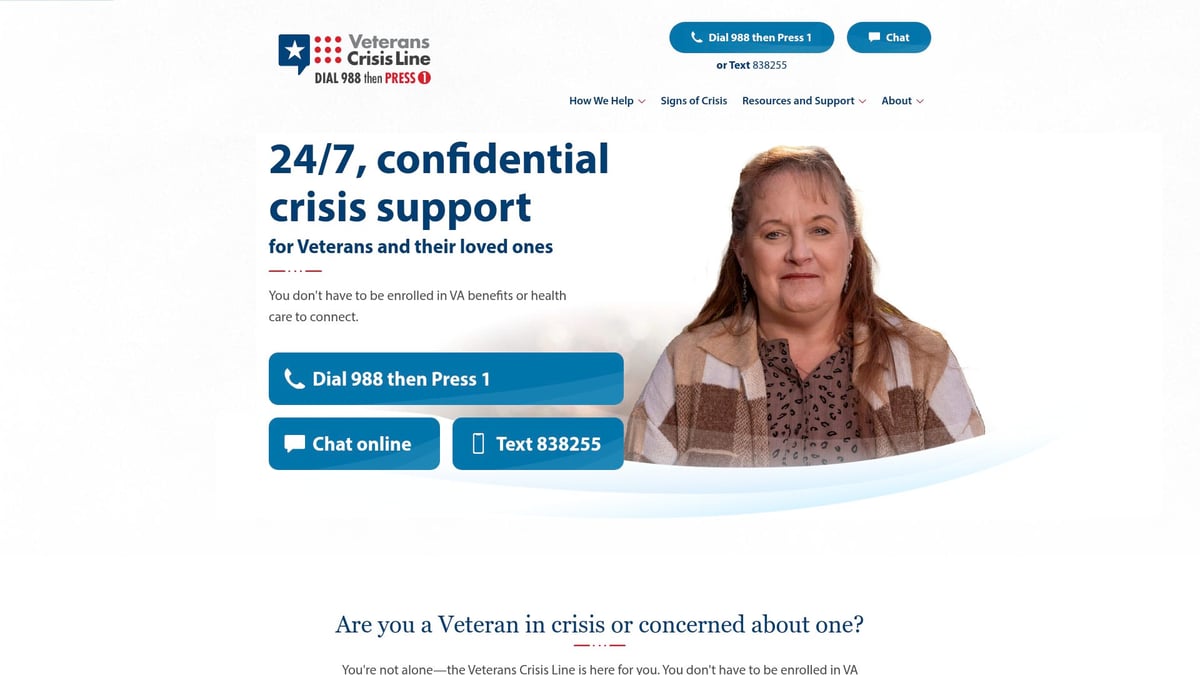
Support is available via phone, text, and chat, with seamless links to VA resources and peer support. The line is designed to address issues such as PTSD, depression, and transition challenges.
Key features:
- Dedicated to veterans, active duty, and their loved ones
- Fast response and integration with VA services
- Culturally competent care
Pros:
- Specialized knowledge of military mental health needs
- High satisfaction—98% of users report improvement after contact
Cons:
- Limited to military-affiliated individuals
For those seeking resources mental health professionals recommend for military-specific care, the Veterans Crisis Line is an essential option.
7. Anxiety and Depression Association of America (ADAA) Peer-to-Peer Communities
ADAA’s Peer-to-Peer Communities are trusted resources mental health professionals highlight for individuals with anxiety, depression, and related disorders. These free, online forums are moderated for safety and constructive engagement.
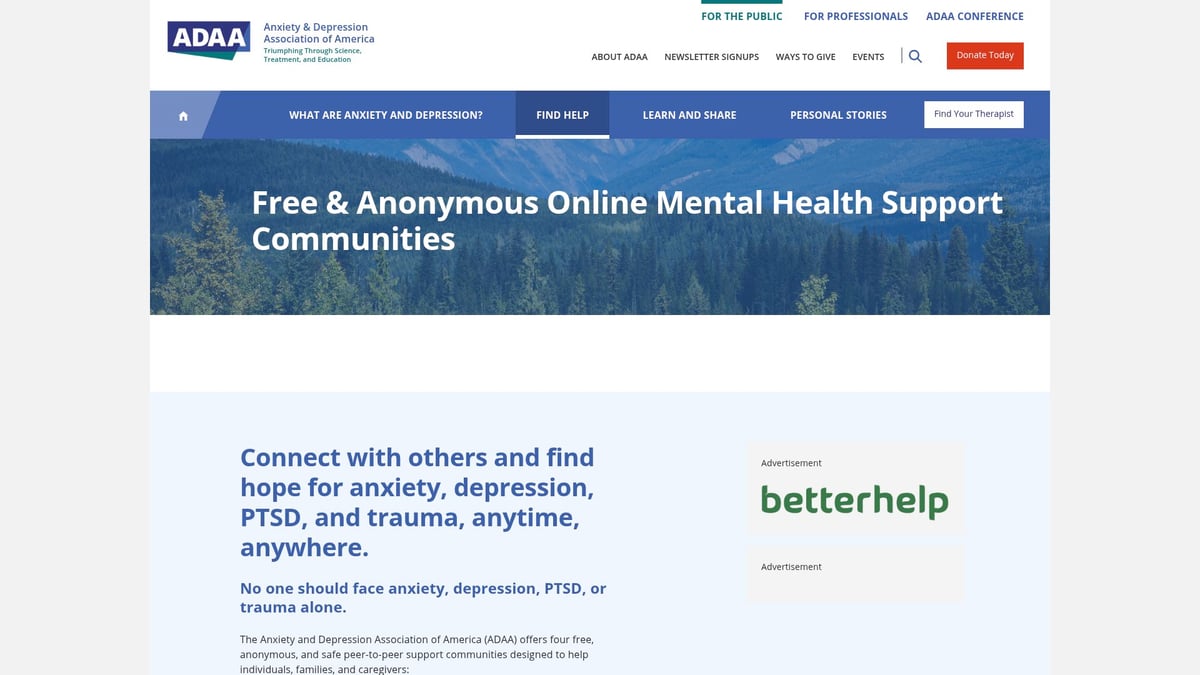
Members can access webinars, self-help tools, and expert Q&A sessions, all designed to foster a supportive, stigma-free environment. The platform is available 24/7, accommodating a wide range of schedules and needs.
Key features:
- Peer-led support groups for adults and teens
- Expert moderation and diverse discussion topics
- Comprehensive resources mental health users value
Pros:
- Always available and free to join
- Large, active community—over 100,000 members in 2024
Cons:
- Not a substitute for professional therapy
ADAA’s communities are an invaluable part of the resources mental health ecosystem, promoting connection and resilience.
8. National Domestic Violence Hotline
The National Domestic Violence Hotline is a critical resource among the resources mental health experts recommend for those impacted by abuse. This 24/7 confidential hotline offers crisis intervention, safety planning, and referrals to local support services.
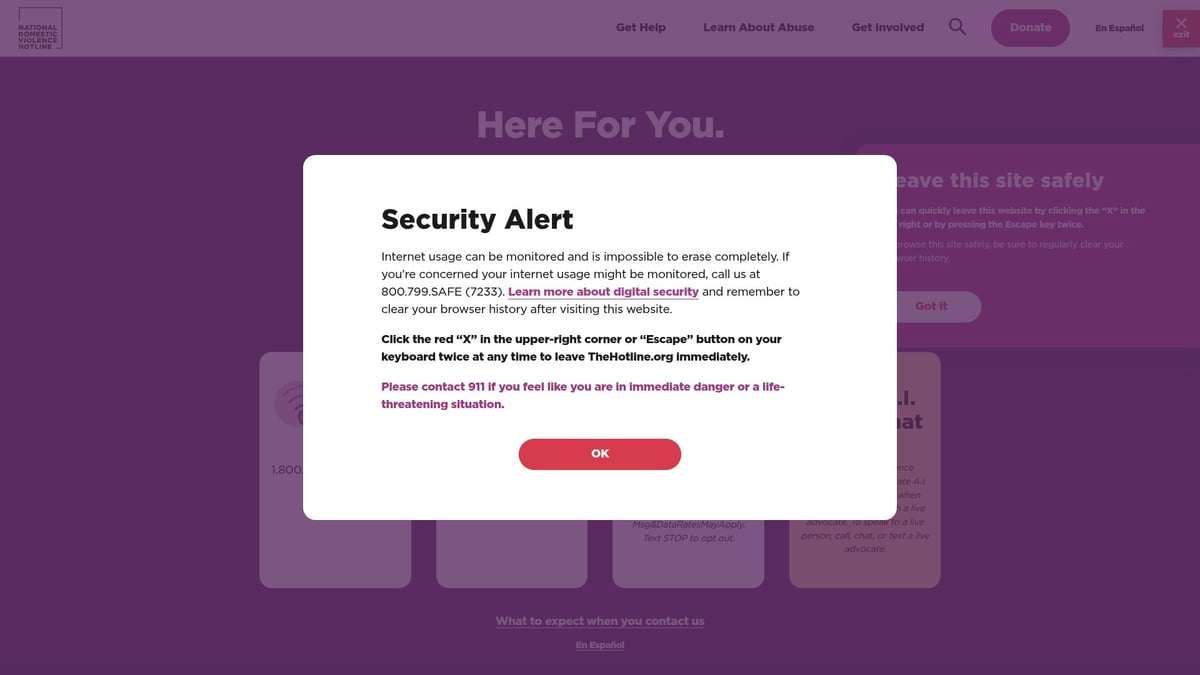
With multilingual support and accessibility features for the deaf and hard of hearing, the hotline ensures help is available to all. Compassionate staff provide immediate assistance and ongoing support for survivors and their networks.
Key features:
- Crisis intervention and safety planning
- Inclusive support for diverse communities
- Extensive database of local resources mental health professionals trust
Pros:
- Compassionate, expert staff
- Over 700,000 supported contacts in 2024
Cons:
- Focus is on domestic violence, not general mental health
For those facing abuse, the National Domestic Violence Hotline stands as a vital resource for safety and recovery.
How to Choose the Right Mental Health Resource for Your Needs
Selecting the best resources mental health experts recommend starts with a clear understanding of your unique situation. With so many options available in 2025, making informed choices is key to effective support and positive outcomes.
Assessing Your Situation and Needs
Begin by reflecting on your current mental health needs. Are you seeking immediate crisis intervention, ongoing support, or specialized care for issues like trauma, anxiety, or substance use? Age, identity, and background all influence which resources mental health professionals may suggest.
For example, a young person navigating identity concerns might benefit from the Trevor Project, while veterans often find tailored support through the Veterans Crisis Line. Taking stock of your symptoms, urgency, and preferences will help match you with the right resources mental health experts trust.
Evaluating Accessibility and Fit
Once you have identified your needs, consider practical factors that affect how you access resources mental health providers offer. Look for 24/7 availability, language options, and preferred formats such as digital platforms or in-person meetings.
Inclusivity and cultural competence are essential. For instance, ADAA forums provide remote peer support, while NAMI groups offer local community connections. If you require trauma-specific care, exploring certified trauma-informed care training can guide you toward providers skilled in addressing complex needs. This ensures the resources mental health experts recommend are both accessible and tailored to your situation.
Integrating Multiple Resources for Holistic Support
Optimal wellbeing often requires a blend of services. Many individuals combine crisis helplines, peer support groups, and professional therapy to create a comprehensive support network. Using government databases like SAMHSA can help you discover local options that complement national or online resources mental health professionals endorse.
For example, pairing NAMI support groups with digital self-help tools or therapy can address multiple aspects of mental health. Holistic support means not relying on a single solution but integrating several resources mental health specialists recommend for well-rounded care.
Staying Informed About New and Emerging Resources
The mental health field is rapidly evolving, with innovative tools emerging every year. Stay updated by following reputable organizations and exploring new digital platforms with expert approval. For instance, advancements in AI in mental health care are opening up new possibilities for support and self-management.
Regularly reviewing updates and trying new resources mental health authorities endorse can ensure you benefit from the latest and most effective support. Staying proactive in your search empowers you to adapt as your needs and the landscape change.
Specialized Resources for Diverse Communities
Access to resources mental health experts recommend is crucial for every community, especially those with unique challenges or barriers. In 2025, specialized support is more available than ever, ensuring that no group is left behind. Below, we highlight how resources mental health organizations have tailored their approaches for youth, BIPOC and LGBTQ+ groups, veterans, and older adults.
Youth and Young Adults
Young people face unique pressures, from academic stress to social media challenges. In response, resources mental health professionals create focus on digital accessibility and peer support. Services like The Trevor Project and Youthline offer crisis intervention specifically for youth, with text and chat options that match their communication preferences.
These resources mental health services provide safe, judgment-free spaces where young people can connect and share. Programs such as Active Minds on college campuses use awareness activities to reduce stigma and encourage help-seeking. For actionable ideas, explore mental health awareness activities designed for youth engagement.
BIPOC and LGBTQ+ Communities
Resources mental health organizations design for BIPOC and LGBTQ+ communities prioritize cultural competence and inclusion. Hotlines like the StrongHearts Native Helpline and NAMI’s identity-based groups address the specific needs of these populations. Multilingual support and community-specific outreach are essential for breaking down barriers and building trust.
Specialized resources mental health programs also offer safe spaces for individuals to discuss shared experiences. This support reduces isolation and helps address disparities in care. The recent growth in culturally tailored hotlines highlights the importance of meeting people where they are.
Veterans and First Responders
Veterans and first responders have distinct mental health needs due to trauma exposure and occupational stress. Dedicated resources mental health services, such as the Veterans Crisis Line and UCF RESTORES, provide trauma-informed care and peer support. These programs understand military and emergency responder culture, building trust with those they serve.
Peer-led initiatives and specialized PTSD support make a significant impact. By connecting with others who have similar experiences, veterans and first responders receive validation and targeted resources mental health professionals recommend for recovery.
Older Adults and Caregivers
Older adults and caregivers often require resources mental health services that address age-specific challenges, such as isolation, chronic illness, or caregiving stress. Trusted organizations like the National Council on Aging and SHIP Help offer accessible information, Medicare guidance, and support groups tailored to seniors’ needs.
Telehealth has expanded dramatically, making resources mental health professionals provide more accessible for older adults in 2025. Caregivers also benefit from specialized support, easing the emotional and practical burdens they face. These targeted services help ensure wellbeing for both seniors and those caring for them.
As you reflect on the expert-recommended mental health resources highlighted for 2025, it’s clear that having the right support—whether that’s a crisis helpline, a peer group, or tailored workplace training—can make all the difference for your wellbeing or your team’s success. If you’re ready to take the next step in strengthening mental health in your workplace or want to explore practical, evidence-based strategies, I encourage you to Find Out More. You’ll discover how specialized programs can empower you and your organization to build resilience and foster a healthier, more supportive environment.


